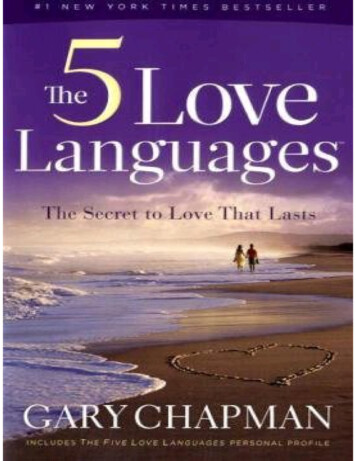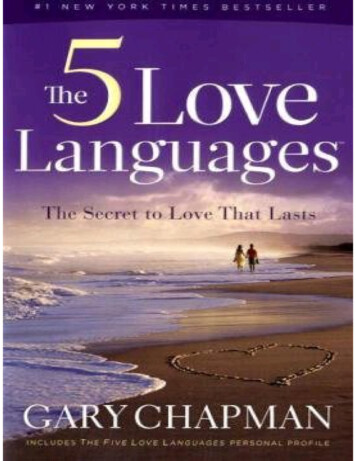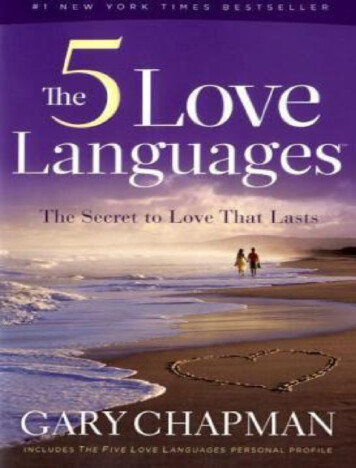
Transcription
bellhooksOutlaw CultureResisting representations20061 L c,to" :New York and LondonCdI5S
.OVE AS THE PRACTICE OF FREEDOMIN this society, there is no powerful discourse on love emerging either frompolitically progressive radicals or from the Left. The absence of a sustained focus on love in progressive circles arises from a collective failureto acknowledge the needs of the spirit and an overdetermined emphasison material concerns. Without love, our efforts to liberate ourselves andour world community from o pression and exploitation are doomed. Aslong as we refuse to addressfblly the place of love in struggles for liberation we will not be able to create a culture of conversion where there is amass turning away from an ethic of domination.Without an ethic of love shaping the direction of our political visionand our radical aspirations, we are often seduced, in one way or the other,into continued allegiance to systems of domination-imperialism, sexism, racism, classism. It has always puzzled me that women and men whospend a lifetime working to resist and oppose one form of domination canbe systematically supporting another. I have been puzzled by powerfulvisionary black male leaders who can speak and act passionately in resistance to racial domination and accept and embrace sexist domination ofP
women, by feminist white women who work daily to eradicate sexism butwho have major blind spots when it comes to acknowledging and resistingracism and white supremacist domination of the planet. Critically examining these blind spots, I condude that many of us are motivated to moveagainst domination sole when we feel our self-interest directly threatened. Often, then, the 1 ngi g is not for a collective transformation ofsociety, an end to politics of dominations, but rather simply for an end towhat we feel is hurting us. This is why we desperately need an ethic of loveto intervene in our self-centered longing for change. Fundamentally, if weare only committed to an improvement in that politic of domination thatwe feel leads directly to our individual exploitation or oppression, we notonly remain attached to the status quo but act in complicity with it, nurturing and maintaining those very systems of domination. Until we are allable to accept the interlocking, interdependent nature of systems of domination and recognize specific ways each system is maintained, we will continue to act in ways that undermine our individual quest for freedom andcollective liberation struggle.The ability to acknowledge blind spots can emerge only as we expand our concern about politics of domination and our capacity to careabout the oppression and exploitation of others. A love ethic makes thisexpansion possible. Civil rights movement transformed society in theUnited States because it was fundamentally rooted in a love ethic. Noleader has emphasized this ethic more than Martin Luther King, Jr. Hehad the prophetic insight to recognize that a revolution built on anyother foundation would fail. Again and again, King testified that he had"decided to love" because he believed deeply that if we are "seeking thehighest good" we "find it through love" because this is "the key thatunlocks the door to the meaning of ultimate reality." And the point ofbeing in touch with a transcendent reality is that we struggle for justice,all the while realizing that we are always more than our race, class, or sex.When I look back at the civil rights movement which was in many wayslimited because it was a reformist effort, I see that it had the power tomove masses of people to act in the interest of racial justice-and because it was profoundly rooted in a love ethic.The sixties Black Power movement shifted away from that love ethic.The emphasis was now more on power. And it is not surprising that thesexism that had always undermined the black liberation struggle intensi-L1q31
Ified, that a misogynist approach to women became central as the equation of freedom with patriarchal manhood became a norm among black"oliticalleaders, almost all of whom were male. Indeed, the new militancy of masculinist black power equated love with weakness, announc. ing that the quintessential expression of freedom would be thewillingness to coerce, do violence, terrorize, indeed utilize the weaponsof domination. This was the crudest embodiment of Malcolm X's boldcredo "by any means necessary."On the positive side, Black Power movement shifted the focus ofblack liberation struggle from reform to revolution. This was an irnportant political development, bringing with it a stronger anti-imperialist,global perspective. However, masculinist sexist biases in leadership led tothe suppression of the love ethic. Hence progress was made even as something valuable was lost. While King had focused on loving our enemies,Malcolm called us back to ourselves, acknowledging that taking care ofblackness was our central responsibility. Even though King talked aboutthe importance of black self-love, he talked more about loving our enemies. Ultimately, neither he nor Malcolm lived long enough to fully integrate the love ethic into a vision of political decolonization that wouldprovide a blueprint for the eradication of black self-hatred.Black folks entering the realm of racially integrated, American lifebecause of the success of civil rights and black power movement suddenly found we were grappling with an intensification of internalizedracism. The deaths of these important leaders (as well as liberal whiteleaders who were major allies in the struggle for racial equality) usheredin tremendous feelings of hopelessness, powerlessness, and despair.Wounded in that space where we would know love, black people collectively experienced intense pain and anguish about our future. The absence of public spaces where that pain could be articulated, expressed,shared meant that it was held in-festering, suppressing the possibilitythat this collective grief would be reconciled in community even as waysto move beyond it and continue resistance struggle would be envisioned.Feeling as though "he world had really come to an end," in the sense thata hope had died that racial justice would become the norm, a life-threatening despair took hold in black life. We will never know to what extentthe black masculinist focus on hardness and toughness served as a barrierpreventing sustained public acknowledgment of the enormous grief andII
pain in black life. In World as Lover, World as Self; Joanna Macy emphasizes in her chapter on "Despair Work" thatthe refusal to feel takes a heavy toll. Not only is there an irnpoverishment of our emotional and sensory life . . .but this psychic numbingalso impedes our capacity to process and respond to information.The energy expended in pushing down despair is diverted from morecreative uses, depleting the resilience and imagination needed forfresh visions and strategies."If black folks are to move forward in our struggle for liberation, we mustconfront the legacy of this unreconciled grief, for it has been the breedingground for profound nihilistic despair. We must collectively return to aradical political vision of social change rooted in a love ethic and seekonce again to convert masses of people, black and nonblack.A culture of domination is anti-love. It requires violence to sustainitself. To choose love is to go against the prevailing values of the culture.Many people feel unable to love either themselves or others because theydo not know what love is. Contemporary songs like Tina Turner's"What's Love Got To Do With It" advocate a system of exchange arounddesire, mirroring the economics of capitalism: the idea that love isimportant is mocked. In his essay "Love and Need: Is Love a Package or aMessage?" Thomas Merton argues that we are taught within the framework of competitive consumer capitalism to see love as a business deal:"This concept of love assumes that the machinery of buying and sellingof needs is what makes everything run. It regards life as a market and loveas a variation on free enterprise." Though many folks recognize and critique the commercialization of love, they see no alternative. Not knowinghow to love or even what love is, many people feel emotionally lost; 0thers search for definitions, for ways to sustain a love ethic in a culture thatnegates human value and valorizes materialism.The sales of books focusing on recovery, books that seek to teafolks ways to improve self-esteem, self-love, and our ability to be intimate in relationships, affirm that there is public awareness of a lackmost people's lives. M. Scott Peck's self-help book The Road Less Traveleis enormously popular because it addresses that lack.Peck offers a working definition for love that is useful for those ofwho would like to make a love ethic the core of all human interaction.
1Etdefines love as "the will to extend one's self for the purpose of nurturingone's own or another's spiritual growth." Commenting on prevailing culturd attitudes about love, Peck writes:Everyone in our culture desires to some extent to be loving, yet manyare in fact not loving. I therefore conclude that the desire to love isnot itself love. Love is as love does. Love is an act of will-namelyboth an intention and an action. Will also implies choice. We do nothave to love. We choose to love.His words echo Martin Luther King's declaration, "I have decided to love:'which also emphasizes choice. King believed that love is "ultimately theonly answer" to the problems facing this nation and the entire planet. Ishare that belief and the conviction that it is in choosing love, and beginning with love as the ethical foundation for politics, that we are best positioned to transform society in ways that enhance the collective good.It is truly amazing that King had the courage to speak as much as hedid about the transformative power of love in a culture where such talk isoften seen as merely sentimental. In progressive political circles, to speakof love is to guarantee that one will be dismissed or considered naive. Butoutside those circles there are many people who openly acknowledge thatthey are consumed by feelings of self-hatred, who feel worthless, whowant a way out. Often they are too trapped by paralyzing despair to beable to engage effectively in any movement for social change. However, ifthe leaders of such movements refuse to address the anguish and pain oftheir lives, they will never be motivated to consider personal and politicalrecovery. Any political movement that can effectively address these needsof the spirit in the context of liberation struggle will succeed.In the past, most folks both learned about and tended the needs ofthe spirit in the context of religious experience. The institutionalizationand commercialization of the church has undermined the power of religious community to transform souls, to intervene politically. Commenting on the collective sense of spiritual loss in modern society, CornelWest asserts:There is a pervasive impoverishment of the spirit in American society, and especially among Black people. Historically, there have beencultural forces and traditions, like the church, that held cold-hearted-
ness and mean-spiritedness at bay. However, today's impoverishmentof the spirit means that this coldness and meanness is becoming moreand more pervasive. The church kept these forces at bay by promoting a sense of respect for others, a sense of solidarity, a sense of meaning and value which would usher in the strength to battle against evil.Life-sustaining political communities can provide a similar space for therenewal of the spirit. That can happen only if we address the needs of thespirit in progressive political theory and practice.Often when Cornel West and I speak with large groups of black folksabout the impoverishment of spirit in black life, the lovelessness, sharingthat we can collectively recover ourselves in love, the response is overwhelming. Folks want to know how to begin the practice of loving. Forme that is where education for critical consciousness has to enter. When Ilook at my life, searching it for a blueprint that aided me in the process ofdecolonization, of personal and political self-recovery, I know that it waslearning the truth about how systems of domination operate that helped,learning to look both inward and outward with a critical eye. Awarenessis central to the process of love as the practice of freedom. Wheneverthose of us who are members of exploited and oppressed groups dare tocritically interrogate our locations, the identities and allegiances thatinform how we live our lives, we begin the process of decolonization. Ifwe discover in ourselves self-hatred, low self-esteem, or internalizedwhite supremacist thinking and we face it, we can begin to heal. Acknowledging the truth of our reality, both individual and collective, is anecessary stage for personal and political growth. T h i s i h i s i s u s u a l painful stage in the process of learning to love-the one many of us seekto avoid. Again, once we choose love, we instinctively possess the innerresources to confront that pain. Moving through the pain to the otherside we find the joy, the freedom of spirit that a love ethic brings.Choosing love we also choose to live in community, and that meansthat we do not have to change by ourselves. We can count on criticalaffirmation and dialogue with comrades walking a similar path. AfricanAmerican theologian Howard Thurman believed that we best learn loveas the practice of freedom in the context of community. Commenting onthis aspect of his work in the essay "Spirituality out on The Deep," LutherSmith reminds us that Thurman felt the United States was given to----------
diverse groups of people by the universal life force as a location for thebuilding of community. Paraphrasing Thurman, he writes: "Truthbecomes true in community. The social order hungers for a center (i.e.spirit, soul) that gives it identity, power, and purpose. America, and allcultural entities, are in search of a soul." Working within community,whether it be sharing a project with another person, or with a largergroup, we are able to experience joy in struggle. That joy needs to be documented. For if we only focus on the pain, the difficultieswhich are surelyreal in any process of transformation, we only show a partial picture.A love ethic emphasizes the importance of service to others. Withinthe value system of the United States any task or job that is related to"service" is devalued. Service strengthens our capacity to know compassion and deepens our insight. To serve another I cannot see them as anobject, I must see their subjecthood. Sharing the teaching of Shambalawarriors, Buddhist Joanna Macy writes that we need weapons of compas-You have to have compassion because it gives you the juice, the power,the passion to move. When you open to the pain of the world youmove, you act. But that weapon is not enough. It can burn you out, soyou need the other-you need insight into the radical interdependence of all phenomena. With that wisdom you know that it is not abattle between good guys and bad guys, but that the line betweengood and evil runs through the landscape of every human heart. Withinsight into our profound interrelatedness, you know that actionsundertaken with pure intent have repercussions throughout the webof life, beyond what you can measure or discern.Macy shares that compassion and insight can "sustain us as agents ofwholesome change" for they are "gifts for us to claim now in the healingof our world." In part, we learn to love by giving service. This is again adimension of what Peck means when he speaks of extending ourselvesfor another.The civil rights movement had the power to transform societybecause the individuals who struggle alone and in community for freedom and justice wanted these gifts to be for all, not just the suffering andthe oppressed. Visionary black leaders such as Septima Clark, Fannie LouHamer, Martin Luther King, Jr., and Howard Thurman warned again iso-IIa
lationism. They encouraged black people to look beyond our own circumstances and assume responsibility for the planet. This call for communion with a world beyond the self, the tribe, the race, the nation, was aconstant invitation for personal expansion and growth. When masses ofblack folks starting thinking solely in terms of "us and them," internalizing the value system of white supremacist capitalist patriarchy, blindspots developed, the capacity for empathy needed for the building ofcommunity was diminished. To heal our wounded body politic we mustreaffirm our commitment to a vision of what King referred to in the essay"Facing the Challenge of a New Age" as a genuine commitment to "freedom and justice for all." My heart is uplifted when I read King's essay; Iam reminded where true liberation leads us. It leads us beyond resistanceto transformation. King tells us that "the end is reconciliation, the end isredemption, the end is the creation of the beloved community." Themoment we choose to love we begin to move against domination, againstoppression. The moment we choose to love we begin to move towardsfreedom, to act in ways that liberate ourselves and others. That action isthe testimony of love as the practice of freedom.
tique the commercialization of love, they see no alternative. Not knowing how to love or even what love is, many people feel emotionally lost; 0th ers search for definitions, for ways to sustain a love ethic in a culture that negates human value and valorizes materialism. The sales of books focusing on recovery, books that seek to tea











